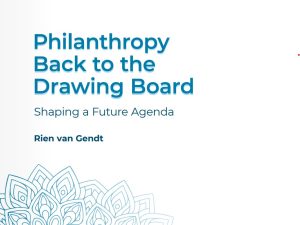The Cambridge Dictionary defines the phrase ‘back to the drawing board’, as ‘back to the beginning of a process to start it again, because it is not working’. Everybody should listen when one of the most respected leaders in European and transatlantic philanthropy suggests a reboot of the sector. But this is not a philosophical manifesto. Van Gendt develops an agenda on the future of European philanthropy – his focus is on larger foundations and public charities – rooted in experience, presents many examples from both sides of the Atlantic and covers foundation management from strategy to management.
Rien van Gendt
Van Gendt expresses a deep concern over the state of the world. Covid-19, the war in Ukraine and climate change are for him disruptions that are not only changing the world, but also the way philanthropy needs to act. He writes in his opening remarks: ‘We will have to look to the future with a fresh perspective, because developments from the past are no guarantee for the future.’ The author looks at this future in both a pragmatic way. I have not read the word ‘Realpolitik’ in a philanthropy book for a long time. He is also optimistic. The book is a testimony to change happening in the sector and the strong belief in the power to change it still further through a new generation.
He argues that climate change, for example, is an issue for all philanthropy no matter what the thematic focus of a foundation is: ‘Against this background it has become even clearer that financing “single issues” without considering the larger connections should be avoided.’ Managing complexity, thinking in systems, and understanding interconnectedness are skillsets that are featured in such considerations. All this is part of philanthropy reconnecting with the common good and societal expectations of it because, ‘without trust, there can be no legitimacy’ for philanthropy.
The book is a provocation for everybody who still believes the investment of a foundation’s endowment has nothing to do with the issues it gets involved in. I have not read for a long time such a comprehensive commitment to mission-related investing, impact investing and even shareholder activism, nor such a strong argument for a fresh look at foundation governance regulation and a ‘system of checks and balance’ at this level of a foundation. The frank attack on big tech and the threat disinformation poses for democracy, climate change or equality is heartening. It is refreshing to read that digitalization and access to media is on the list of future areas on which philanthropy must act.
The book is a provocation for everybody who still believes the investment of a foundation’s endowment has nothing to do with the issues it gets involved in. I have not read for a long time such a comprehensive commitment to mission-related investing, impact investing and even shareholder activism
More frustrating than encouraging are the topics raised in the ‘Focus on’ sections of the book. One is on the relationship between philanthropy and philanthropy research. The author points out the importance of academic research on philanthropy, yet the reality in many European universities is sobering. Also frustrating is that the author needs to say that foundations ‘could be more transparent about how they want to contribute to the common good’ as a measure to counter-regulation by the government. It is amazing that we still must argue for transparency of intention these days.
Rien van Gent´s book also includes a section on European philanthropy, urging both a philanthropy for Europe and European philanthropy – not just philanthropic links between Lisbon, Helsinki, Sofia, and Athens, but also philanthropic initiatives that embrace them all. The author attributes much of the success there has so far been in this regard to pan-European philanthropy associations.
 The book covers so much ground. It is a translation of a book van Gendt published earlier this year in Dutch and is a unique contribution to the philanthropy debate. It brings together the author’s long track record in philanthropy with a vision for its future. The author concludes at the end that ‘working in a volatile environment means that internal reflection is not a one-off exercise but should be part of the culture of an organization’. If that can be achieved, philanthropy really should go back to the drawing board.
The book covers so much ground. It is a translation of a book van Gendt published earlier this year in Dutch and is a unique contribution to the philanthropy debate. It brings together the author’s long track record in philanthropy with a vision for its future. The author concludes at the end that ‘working in a volatile environment means that internal reflection is not a one-off exercise but should be part of the culture of an organization’. If that can be achieved, philanthropy really should go back to the drawing board.
Michael Seberich is Managing Director, Wider Sense. Email seberich@widersense.org
Philanthropy Back to the Drawing Board – Shaping a Future Agenda by Rien van Gendt is available to download via Philea’s virtual library via this link
Credit:Source link




